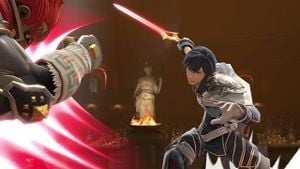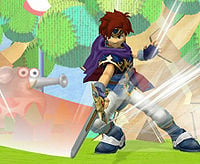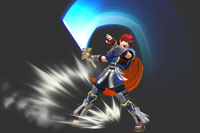Double-Edge Dance: Difference between revisions
mNo edit summary |
No edit summary |
||
| Line 1: | Line 1: | ||
{{ArticleIcons|melee=y|ssb4=y|ultimate=y}} | {{ArticleIcons|melee=y|ssb4=y|ultimate=y}} | ||
{{merge|[[Dancing Blade]]}} | |||
{{Infobox Special Move | {{Infobox Special Move | ||
|name=Double-Edge Dance | |name=Double-Edge Dance | ||
Revision as of 18:06, March 14, 2019
| Double-Edge Dance | |
|---|---|
 Chrom performing the move in Ultimate. | |
| User | Roy Chrom |
| Universe | Fire Emblem |
| “ | Slashes opponents up to four times, with repeated button presses. Tilting up or down can change each attack. | ” |
| —Description from Ultimate's Move List | ||
Double-Edge Dance (マーベラスコンビネーション, Marvelous Combination), often abbreviated DED, is Roy and Chrom's side special move.
It is a variation of Marth's Dancing Blade (with which it shares its Japanese name), and has the same general behavior. However, the third hit inputted downwards and the last hit inputted in any direction deal a fire effect. Chrom's Double-Edge Dance doesn't have a fire effect, however.
In Super Smash Bros. Melee
This move is integral to Roy's metagame due to its range, speed, and KO potential. It is particularly effective for approaching, as the first hit can lead into a down tilt, grab, or the subsequent hits of the attack.
The first two hits of the four hit combo are relatively weak and easily crouch canceled by opponents, but they will come out no matter how quickly they are inputted. For the third and fourth hits, the player must wait a few frames between inputs or else the attacks will not come out. The tradeoff for the difficulty in inputting the later hits is significantly higher knockback, which can knock over opponents trying to crouch cancel.
The third hit of the combination inputted upwards has a meteor smash hitbox, producing a slightly diagonal trajectory if the sourspot doesn't hit. On grounded opponents, it will knock them into the air and set up for the fourth hit. Inputted forwards, the third hit deals excellent knockback and can be used as a KO move at higher percentages. The third hit inputted downwards produces a flame effect and can knock over opponents trying to crouch cancel. Unusually, while the third hit forwards has higher base knockback, its growth is actually smaller than Dancing Blade's version, meaning it is overall less powerful at higher percentages, while also being harder to link the fourth hit together with the third hit at lower percentages.
With the exception of the downwards input, the final hits of DED deal the most knockback compared to the other hits. The upwards input has high vertical range and high knockback. The down input actually deals multiple hits, and while it deals little knockback, its long range and duration make it effective for shield stabbing and knocking down opponents attempting to crouch cancel. Compared to the other inputs, the forward one is lackluster, and rarely used.
In Super Smash Bros. 4
Double-Edge Dance returns in SSB4, where it has been updated to use Marth's Dancing Blade animations from Brawl and SSB4, making it one of Roy's only attacks that has not gained an animation distinct from Marth. Its many attacks have gained different attributes when compared to Melee, making its hits act identically to Marth's version.
The unique attributes of Double-Edge Dance have now been removed: the third hit no longer acts as a flame-infused strong hit, and now chains into the fourth hit, which acts as the finisher. Additionally, all angles of the first three swings now connect into the ending hit. As a result, its only functional difference is the placement of the sweetspot. Like Dancing Blade, it is now an integral move for damage-racking, catching landings and shield-pressuring when the opponent is close.
As Roy shares Marth's technical changes from Melee to Smash 4, Double-Edge Dance now require less technical precision to input in a row and makes the attack easier to combo, but suffers from similar issues with connecting together at higher percentages.
As with Dancing Blade in Brawl and Smash 4, the first hit stalls Roy's movement in the air for a few frames, although Roy's higher falling speed makes this unusable for recovery in comparison to Marth's.
In Super Smash Bros. Ultimate
Double-Edge Dance returns as Roy's side special move in Ultimate. Much like in Smash 4, Double-Edge Dance has received identical buffs to match Marth's Dancing Blade: each swing transitions significantly faster and can be buffered, all hits have altered animations, and the final downward hit hits only four times. However, the first swing has higher startup, making it easier to predict.
Chrom, Roy's Echo Fighter, shares this special move. As Chrom's Falchion lacks a sweetspot and sourspot, his version of Double-Edge Dance deals consistent damage and knockback. As a result, his version is effectively a stronger version of Lucina's Dancing Blade.
Customization
Special Move customization was added in Super Smash Bros. 4. These are the variations:
| 1. Double-Edge Dance |
|---|
| "Time your attacks to unleash a four-hit chain. Pressing up or down will change the attack." |
- Double-Edge Dance: Default.
Like the other DLC characters, Roy lacks custom move variations.




